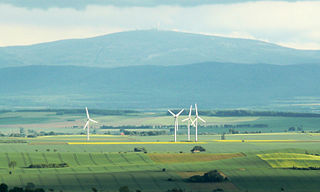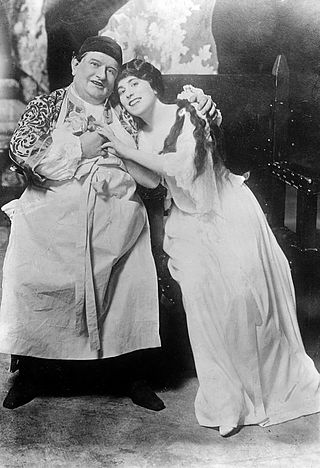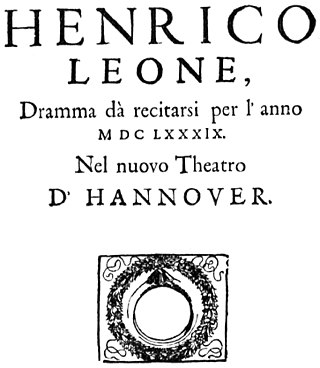
Agostino Steffani was an Italian bishop, polymath, diplomat and composer.

Stefano Benedetto Pallavicino was an Italian poet and opera librettist. He was the son of the composer Carlo Pallavicino (1630?-1688).

Lodoletta is a dramma lirico or lyric opera in three acts by Pietro Mascagni. The libretto is by Giovacchino Forzano, and is based on the novel Two Little Wooden Shoes by Ouida.
The Boston Early Music Festival (BEMF) is a non-profit organization founded in 1980 in Boston, Massachusetts, U.S. to promote historical music performance. It presents an annual concert series in Boston and New York City, produces opera recordings, and organizes a weeklong Festival and Exhibition every two years in Boston. A centerpiece of these festivals has been a fully staged Baroque opera production. One of BEMF's main goals is to unearth lesser-known Baroque operas, which are then performed by the world's leading musicians armed with the latest information on period singing, orchestral performance, costuming, dance, and staging at each biennial Festival. BEMF operas are led by the BEMF Artistic Directors Paul O’Dette and Stephen Stubbs, BEMF Orchestra Director Robert Mealy, and BEMF Opera Director Gilbert Blin. In 2008, BEMF introduced its Chamber Opera Series as part of its annual concert season. The series presents semi-staged productions of chamber operas composed during the Baroque period. In 2011, BEMF took its chamber production of Handel's Acis and Galatea on a four-city North-American tour. In 2004, BEMF initiated a project to record some of its work in the field of Baroque opera on the CPO recording label. The series has since earned five Grammy Award nominations, including a 2015 Grammy Award for Best Opera Recording.

Ritter Pázmán is a three-act opera composed by Johann Strauss II, with the libretto by Ludwig Dóczi. It premiered at the Hofoper in Vienna on New Year's Day in 1892. It is based on a Hungarian narrative poem, Pázmán lovag, by the Hungarian poet János Arany. A performance takes about three hours.

Brunswick Land is a historical region in the Southeast of the German state of Lower Saxony, centred around the city of Braunschweig. It refers to the core territory of the historic Duchy of Brunswick and its successor, the Free State of Brunswick, which was disestablished in 1946.

Una follia is a farsa in one act by composer Gaetano Donizetti. The work premiered on 15 December 1818 at the Teatro San Luca in Venice. The opera uses the same Italian-language libretto by Bartolomeo Merelli after August von Kotzebue's Der Graf von Burgund that Donizetti used for his Enrico di Borgogna a month earlier, but with different music. It was given one performance and "never performed again, and its score has never been found."

L'amore medico is an opera in two acts by composer Ermanno Wolf-Ferrari. Based on Molière's comedy L'Amour médecin, the work uses an Italian language libretto by Enrico Golisciani. It premiered in a German version by Richard Batka on 4 December 1913 at the Hoftheater in Dresden under the title Der Liebhaber als Arzt.

The Brunswick Lion is a medieval sculpture, created in bronze between 1164 and 1176, and the best-known landmark in the German city of Brunswick. The Brunswick Lion was originally located on the Burgplatz square in front of the Brunswick Cathedral. The monument was moved to Dankwarderode Castle in 1980, and later replaced at the original location by a replica. Within Brunswick, it is commonly known as the "Castle Lion" (Burglöwe).

Salvator Rosa is an opera seria in four acts composed by Antônio Carlos Gomes to a libretto in Italian by Antonio Ghislanzoni. It premiered at the Teatro Carlo Felice in Genoa on 21 March 1874. The plot is based on Eugène de Mirecourt's 1851 adventure novel, Masaniello, in turn loosely based on the lives of the Italian painter and poet, Salvator Rosa and Masaniello, a Neapolitan fisherman, who became leader of the 1647 revolt against the Spanish Habsburg rule in Naples.

The Oper am Gänsemarkt was a theatre in Hamburg, Germany, built in 1678 after plans of Girolamo Sartorio at the Gänsemarkt square. It was the first public opera house to be established in Germany: not a court opera, as in many other towns. Everybody could buy a ticket, like in Venice. Most works were in the German language or translated librettos.
Gerhard Faulstich is a German baritone.
Fedra is an opera in two acts composed by Simon Mayr to an Italian-language libretto by Luigi Romanelli based on Racine's play Phèdre.

(Bartolomeo) Ortensio Mauro was an Italian writer and librettist.

Maria Carbone was an Italian operatic soprano. She created the lead female roles in two of Gian Francesco Malipiero's operas: the title role in Ecuba and Cleopatra in Antonio e Cleopatra.
Maria Landini was an Italian soprano who began her career as a singer at the court of Queen Christina in Rome but was primarily active at the imperial court in Vienna from 1711 until her death. She created numerous soprano roles in operas and oratorios by Fux, Caldara, and her second husband, Francesco Bartolomeo Conti and was reputedly the highest paid musician in Vienna at the time.
Orlando generoso is an opera of Agostino Steffani composed to a libretto by Ortensio Mauro after Ariosto's Orlando furioso. The opera was written in 1691, Steffani's fourth for the Duchy of Hanover. The opera was presented again in Hanover in 1692, and in 1695 it was performed at the Oper am Gänsemarkt in Hamburg.
Vittoria Tarquini, also known as La Bombace and Bambagia, was an Italian soprano singer of the Baroque era. She was one of the most celebrated singers of her time and was considered one of the best, if not the greatest, tragic opera singer.













